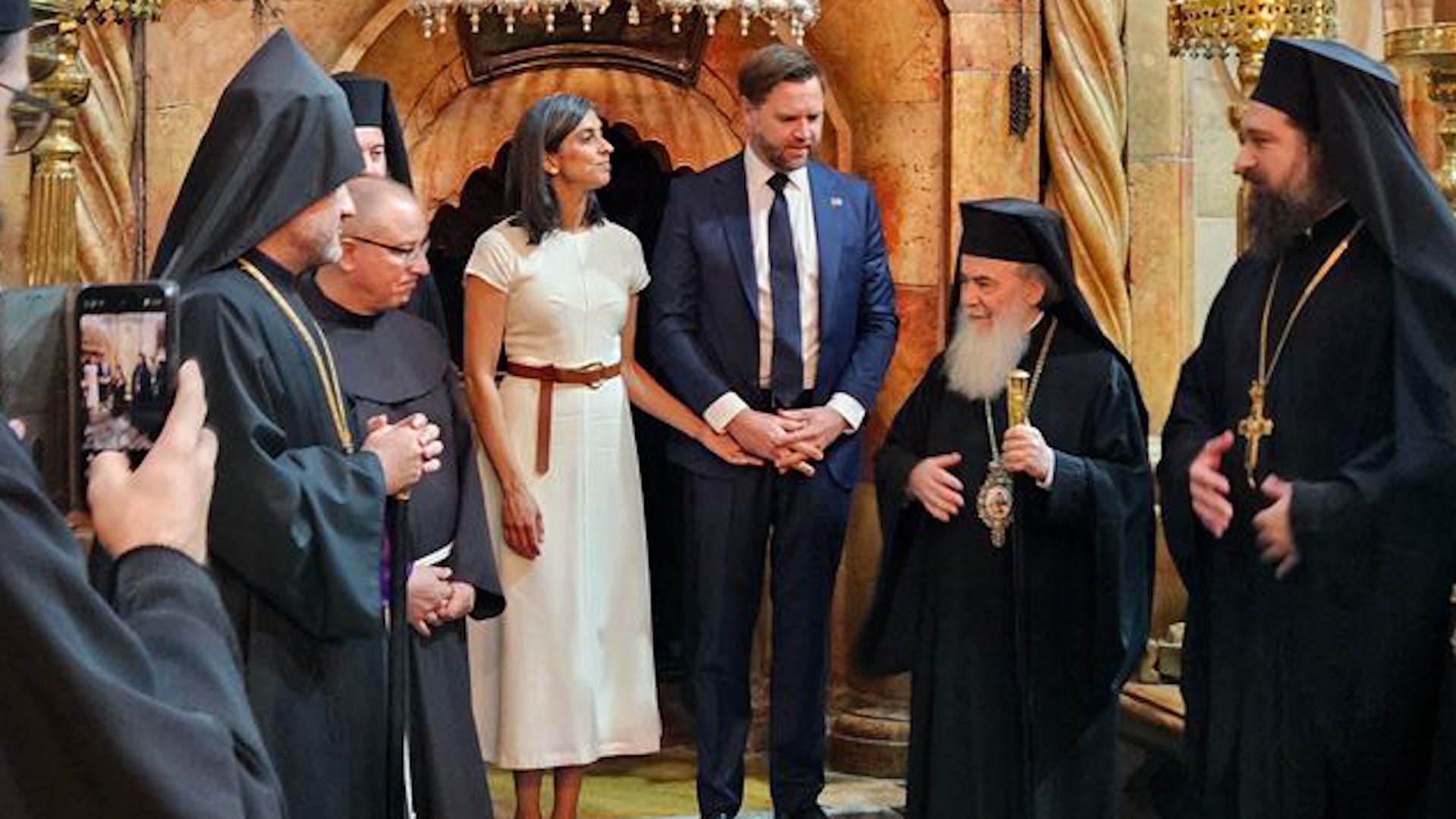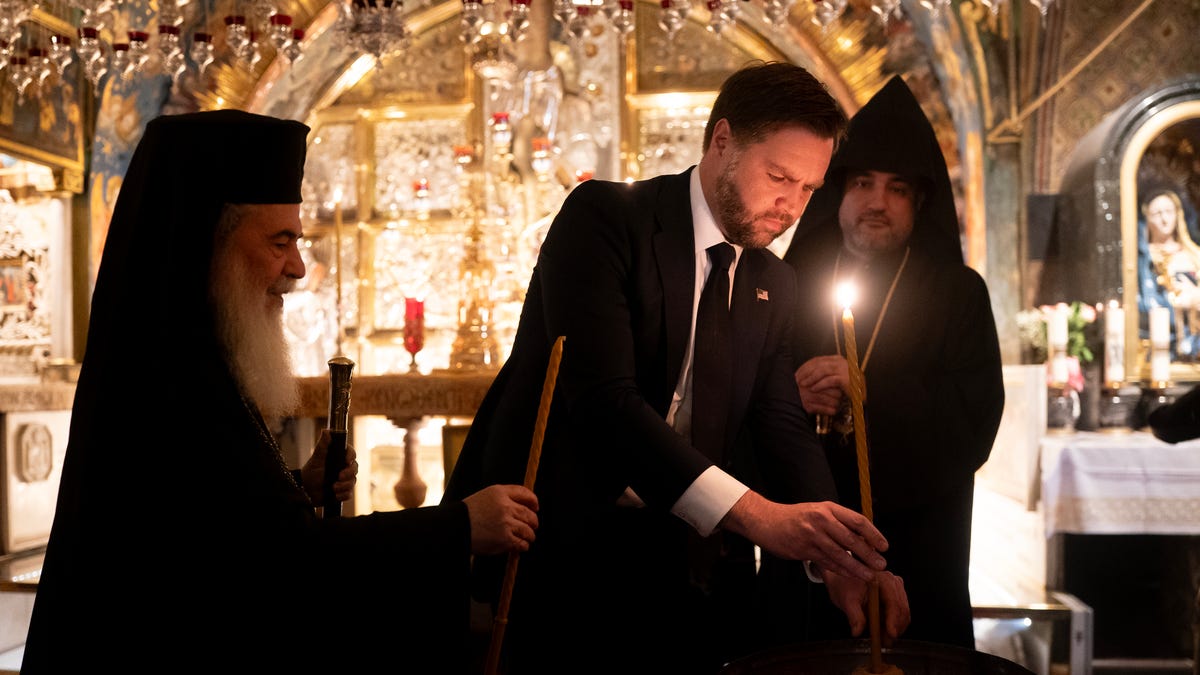Vice President JD Vance leaned on his Catholic faith during a recent visit to Israel to advance President Trump’s Gaza peace proposal.

JD Vance visits Church of the Holy Sepulchre in Jerusalem
Vice President JD Vance attends private mass and confession at Church of the Holy Sepulchre during his trip to Israel.
JERUSALEM – JD Vance lowered himself to kneel on a crimson cushion.
Head bowed and eyes closed, he raised his right hand to his forehead, chest and left shoulder, before placing his palm on the red-hued slab of limestone that lay before him.
For a convert to Catholicism who wears his faith on his sleeve, there could be no holier site. It is there, at the entrance of the Church of the Holy Sepulchre, on the Stone of the Anointing, that Christians believe Jesus’ body was prepared for burial after he was crucified.
Christians have many titles for Jesus. Vance invoked one of them at the start of a visit to Israel last month to shore up President Donald Trump’s Gaza ceasefire.
“I’d ask all people of faith, in particular, my fellow Christians, to pray that the Prince of Peace can continue to work a miracle in this region of the world,” Vance said.
In putting his faith at the forefront of an official White House visit to the contested city that Israelis and Palestinians each claim as their capital, the vice president, who attends Mass every week, showed a side of himself many Americans had yet to see.
Vance is one of the most publicly religious top officials in an administration that’s embraced by Christian conservatives, and his faith is intertwined with his evolution as a political leader. Interest in both has increased as Republicans consider who might inherit Trump’s movement.
“I think he’s becoming bolder and more confident in not only expressing his faith in a public context, but I think he’s also becoming more confident in connecting his faith to his aspirations for leadership and policy,” said Ralph Reed, a friend of Vance’s and the founder and chairman of the conservative Faith & Freedom Coalition.
Although Vance clashed with the late Pope Francis over immigration and visited the Vatican twice this year, the fresh-faced vice president’s religiosity and its influence on his views largely went unnoticed until he took on a more prominent role in the administration’s efforts to maintain a delicate Middle East peace.
The high-profile assignment, coupled with Trump’s acknowledgement a few days later that he is unable to seek a third term, put a spotlight on Vance and his belief system.
Vance has drawn accolades and condemnation since the Mideast visit for coming across as too close or too critical of the state of Israel, depending on the audience – and for expressing a desire to convert his wife Usha to Christianity at a Turning Point USA student town hall, where he was pressed to defend his family’s religious practices.
“I believe in the Christian gospel, and I hope eventually my wife comes to see it the same way. But if she doesn’t, then God says everybody has free will. And so, that doesn’t cause a problem for me,” Vance said at the event.
The exchange led to accusations that Vance had disrespected his wife, who is Indian American and was raised Hindu. It happened two weeks after a student at a town hall sparred with Vivek Ramaswamy, a Republican candidate for Ohio governor, over his Hinduism in a widely shared video.
After Vance slapped back at a commentator, who accused him of throwing his wife’s religion under the bus to win the support of white, Christian nationalists, the debate devolved into a frenzy.
A Catholic Convert
The public pressure of higher office could have put a wedge between the 41-year-old vice president and his faith. Instead, Vance has dived in deeper, his friends say.
Concerned Women for America President Penny Nance, an early backer of Vance’s bid for the U.S. Senate in 2021, pointed to his close friendship with Charlie Kirk, the Turning Point USA co-founder who was shot dead in September.
“I think we’ve got an entire nation, especially of young people, who are really, because of the assassination of Charlie Kirk, really taking the time to reconsider faith or consider faith for the first time,” Nance said.
Vance has described himself as a “baby Catholic” and says he’s learning about the religion he converted to in 2019 after Usha encouraged him to reengage with his faith. He grew up in a Christian household, and later became an atheist, part of a personal journey that saw him serve in the military, attend Yale Law School and write a memoir before running for office.
In an expansive discussion with the New York Times in May, as he attended Pope Leo’s inaugural mass, Vance said church teachings informed his policy stances but he doesn’t treat them as doctrine.
That has sometimes created tension with the Catholic Church. Vance clashed with Pope Francis at the start of the administration over immigration enforcement.
At the same time, the vice president gushed during a recent episode of “Pod Force One” that visiting the Church of the Holy Sepulchre “was probably the single most amazing experience of my life.” Vance took confession while he was there and worshiped at a private mass performed by Franciscan monks.
The church, which sits within the Christian Quarter of the Old City of Jerusalem, is thought to be the location of Jesus’ crucifixion, burial and resurrection. It was the only landmark that Vance told reporters he was hoping to see.
“As a Christian,” Vance said ahead of the visit, “I think the world’s Christians will know that this country − that this region of the world − means a great deal to me.”
In visiting the church, Vance followed a path trod by Trump and Joe Biden, when he was vice president to Barack Obama.
Biden was the nation’s first Catholic vice president and second Catholic president. Trump considers himself a nondenominational Christian. He became the first sitting U.S. president to visit the Old City during his first term.
To have a religious Christian like Vance visit the Old City, said Jacob Thomas, an Israeli-born American who was visiting family near Jerusalem, “I feel like it just sets a certain tone across the world that America has a strong leader in the White House.”
Israel trip put Vance out front
Vance’s last-minute trip to the Middle East came on the heels of alleged ceasefire violations by Israel and Hamas that threatened to rip apart Trump’s hard-won deal.
He was part of a succession of U.S. representatives to visit Israel a week after Trump declared the war in Gaza was over.
Paul Weintraub, a 71-year-old accountant from Woodmere, New York, and his wife, Robyn, a 58-year-old physician, said they knew little about Vance beyond his bestselling memoir, “Hillbilly Elegy.”
“This is an opportunity to put him at the forefront to see what he can do and how he can be measured, by giving him something significant to try to accomplish,” Paul Weintraub said of Vance’s trip. “I don’t think he’s really had – not yet – a real forward role in a lot of things.”
Whether Vance made any real progress toward the second phase of Trump’s peace proposal, which calls for the disarmament of Hamas, was tough to read: the administration has been working behind the scenes to bring countries on board ever since.
As he departed Tel Aviv, Vance was cautiously optimistic about the prospects for an international security force to police Gaza.
A potential obstacle is Israeli Prime Minister Benjamin Netanyahu’s aversion to having Turkish troops on the ground in Gaza. Vance said he’d pushed Netanyahu to help implement the president’s plan.
“My message was just: do whatever you can to work with us to actually make this peace agreement stick, because it’s not going to be easy,” Vance told journalists. “These two sides, there’s a lot of hatred, they’ve been fighting a very brutal war over the last couple of years.””
Vance hones stance on Israel
The rapid visit to Israel provided a glimpse into how Vance, one of the youngest vice presidents in American history, might approach the world stage were he to succeed Trump.
Standing alongside Vance a day prior, the Israeli leader said he was impressed with Vance’s “clarity” and “incisiveness.”
Unlike his blustery boss, whose on-camera banter with world leaders and reporters has been a hallmark of his second term, Vance’s remarks throughout the trip came during carefully-planned moments.
But he opened himself up to friendly fire in his final moments on the tarmac, when he said an Israeli parliament vote to advance the annexation of the West Bank was “a very stupid political stunt,” personally insulting to Vance and out of step with Trump.
Religious conservatives view the territory as part of the Biblical promised land. But the Arab nations whose cooperation Trump needs to enact the Gaza peace agreement consider it part of a future Palestinian state.
After comments by Trump and Vance warning Israel off annexing the West Bank, Family Research Council president Tony Perkins, a top U.S. evangelical leader, chided the administration in a social media post. “I’m praying for President Trump,” he wrote. “Telling Israel it cannot exercise sovereignty within its own borders to appease terror-supporting regimes like Turkey and Qatar is deeply troubling.”
Vance again rejected unconditional American support for Israel a week later at the Turning Points USA event in Mississippi, after a questioner critiqued the the U.S.-Israel alliance.
Vance turned to religion, and the interests of Christians, to justify the close relationship. Recalling his visit to the Church of Holy Sepulchre, Vance said ensuring access to the site for Christians was a way America could work with its friends in Israel.
“There are some significant theological disagreements between Christians and Jews,” Vance added. “My attitude is let’s have those conversations, let’s have those disagreements when we have them. But if there are shared areas of interest, we ought to be willing to do that, too.”
